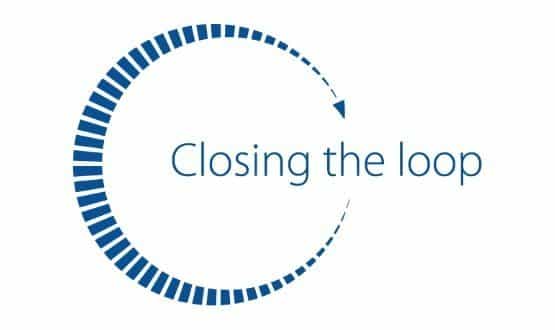Ade Memoire on closing the loop
- 9 February 2015

Results acknowledgement. If this doesn’t keep you awake at night, you’re probably not thinking hard enough.
Thousands of test orders will go through a large hospital every day, requested by anyone from a GP to a hospital FY1 doctor. At some point, we hope, somebody looks at the results and acts upon them.
The tests were, after all, important enough to be worth bleeding the patient or putting them in front of a beam of ionizing radiation. And they might well show something abnormal. So do we really just hope that professionals are conscientious enough to follow up on things?
Process is hard to control
The processes involved are difficult to control, especially as there are, potentially, many ways of viewing a result.
This could be done on traditional paper, in which case the report will be signed off before it is filed in the notes. Or it could be done via direct access to a laboratory system, or via an order communications system.
Only the OCS will really be able to keep track of orders associated with results and sign-off acknowledgement; but if doctors have seen their results on some other viewer then, very often, they are no longer interested in the formal sign-off process.
If this happens, then queues build up and the whole system fails. In order to achieve a closing of the loop, one of the things we must do is have a controlled way of accessing data, so that users are forced to be compliant with process.
Either there must be only one way to access results, or systems must be smart enough to tell the OCS when a result has been acknowledged – and that doesn’t mean just “looked at”. We must also, of course, switch off the paper!
Southampton’s experience, shared
Back in 2006 when Southampton designed its OCS, this issue of acknowledgement was top of the list of requirements. Through some previous adverse events, we were aware of what can happen when a result sits on the wrong patient record or is missed for some other reason.
For this reason we feel fairly advanced in dealing with this subject – though far from perfect – and were prepared to host a webinar in the EHI CIO/CCIO ‘best practice’ series on the subject. At the webinar, two things became apparent. Firstly, there is interest in this issue. And secondly, an assumption that performance is “variable” would be correct.
The issues
Medical staff order thousands of tests daily, hopefully electronically. The results are no longer hard copy filed in notes; but how do we know they have been actioned? Just because someone has looked at them does not indicate acknowledgement.
So who are the right people to sign-off on things, and how is this performance managed? We cannot force people to acknowledge things that they did not request. But then, we cannot force the individual requestor to acknowledge all of their personal orders, as they tend to work in teams and might not be around when the results come back.
A GP friend I talked to recently could not understand why this should be a problem, as he sees all of his results in a convenient inbox function in his clinical system.
To someone like the GP, it is hard to convey the level of complexity in a many-to-many [hospital] system as opposed to the relative simplicity of a one-to-one workflow. Yet in an acute hospital it is probably true that any result that slips through creates more risk to the patient.
So, while this basic point sounds like it should be easy to deal with, I think that all of those on the webinar would agree that it is far from simple to get right.
It’s also clear organisations are not in a position to monitor acknowledgements at all; with one doctor saying he had never acknowledged a laboratory result in his whole career.
Many-to-many
A few scenarios will hopefully help to set out the many-to-many problem (although this is by no means an exhaustive list of all the potential anomalies).
-
A patient may come into the emergency department, have blood tests, and be subsequently admitted. Does the ED doctor take ownership of those results for a patient they are no longer managing, or should they disappear from their queue? In the OCS, can the results be directed to the new team looking after the patient, in their new location?
-
Hospital-at-night teams have a different structure to daytime teams. Bloods may be taken in the day and the results may be available later that night. How do those on the out-of-hours team, who may be working anywhere in the hospital, know to pick them up; and should they authorise them?
-
Should we allow all users of a certain level to acknowledge all tests, or recognise that a test for a certain infection can be signed-off by someone who cannot authorise a chemistry profile? Should we require sign-off at the individual test level, at least for some things?
Information overload
Another problem is information overload. Outpatients is a consultant-led service and, I am told, consultants usually want to see all results for their clinics.
However, we need to filter them out of their lists for inpatient activity, as the junior docs will deal with those and only escalate problems. They then need to be aware of those that have breached time tolerances.
Is it too hard?
In some respects, the webinar felt like washing your pants in public, although it was somewhat cathartic. At Southampton, we are not too bad at results acknowledgement it seems, and we intend to get better.
Current ideas include not letting anyone home without seeing all their data acknowledged. You can imagine how popular that might be with bed managers


Adrian Byrne
Adrian – Ade – Byrne is director of IM&T at University Hospital Southampton NHS Foundation Trust which, he says, has been working on its IT environment for 15 years.
On his LinkedIn profile, he says its aim is to “build an electronic patient record with full decision support, sharing data across disparate, so-called best of breed systems.” The trust is also developing a patient record and services, built on Microsoft HealthVault.





